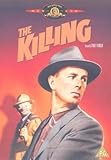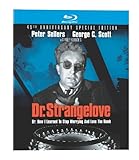Posted by Notcot on Feb 1, 2011 in
Noir 
Among Stanley Kubrick’s early film output The Killing stands out as the most lastingly influential: Quentin Tarantino credits the film as a huge inspiration for Reservoir Dogs and just about any movie or TV show that plays around with its own internal chronology owes the same debt. This sort of convoluted crime caper had really kicked off with John Huston’s The Asphalt Jungle in 1950. From then on, nouveau noir scripts kept trying to find new ways of telling very similar stories. Here the novel Clean Break is adapted for the screen in a jigsaw-puzzle structure that caught Kubrick’s eye. With a dry narration we’re introduced to the key players in a racetrack heist as it’s being planned, but the story bounces back and forth between what happens to each of them during and before the big event. All of this keeps the audience guessing as to exactly how it will go wrong, while the downbeat telling, the unsympathetic characters and the excessively dramatic score clearly foretell that it will go wrong from the start. The denouement is comically daft no matter how many times you see it.
On the DVD: The Killing is a no-frills DVD transfer, in 4:3 ratio and with its original mono soundtrack. Criminally, just one trailer is all that’s been dug up as an extra. –Paul Tonks
<- Read More
Buy Now for [wpramaprice asin=”B000068C3E”] (Best Price)
Tags: asphalt jungle, clean break, crime caper, denouement, downbeat, dramatic score, film output, heist, jigsaw puzzle, John Huston, mono soundtrack, Paul Tonks, Quentin Tarantino, reservoir dogs, Stanley Kubrick
Posted by Notcot on Sep 19, 2010 in
Noir 
Average Rating: 4.5 / 5 (3 Reviews)
This 1941 melodrama is memorable both for its strong central performances and their intimations of how the previous decade’s crime dramas would evolve into film noir–no accident, given the solid direction of veteran Raoul Walsh and the hand of screenwriter John Huston, who teamed with the author of its novelistic source, WR Burnett (Little Caesar). In the central character of Roy “Mad Dog” Earle, a fictional peer to John Dillinger, Humphrey Bogart finds a defining role that anticipates the underlying fatalism and moral ambiguity visible in the career-making roles soon to follow, including Sam Spade in Huston’s directorial debut, The Maltese Falcon (1941).
Earle suggests a prescient variation on the enraged sociopaths that were fixtures of the gangster melodramas that shaped Bogart’s early screen image. Pardoned from a long prison stretch, the weary robber is clearly more eager to savour his new freedom than immediately swing back into action. But his early release has been engineered by a mobster who wants Earle to pull off a high-stakes burglary, setting in motion a plot that is a prototype for doomed heist capers–a small, yet potent sub-genre that would later include Huston’s The Asphalt Jungle (1950) and Stanley Kubrick’s The Killing (1956).
What gives High Sierra its power, however, isn’t the crime itself but Earle’s collision with the younger, brasher confederates picked to help him, and the hard-edged but vulnerable taxi dancer they’re competing for, played forcefully by Ida Lupino, who actually received top billing. Her attraction to the reluctant Earle is complicated by a convoluted sub-plot designed to showcase then starlet Joan Leslie, but the movie finally moves into its most gripping moments when the wounded Earle, pursued by police, flees ever higher toward the mountains. His final, suicidal showdown would become a clich&éacute; of sorts in lesser films, but here it provides a wrenching climax sealed by Lupino’s vivid final scene. –Sam Sutherland
High Sierra [VHS] [1941]
Buy Now for £9.99 (Best Price)
Tags: asphalt jungle, crime dramas, directorial debut, high sierra, humphrey bogart, ida lupino, john dillinger, John Huston, little caesar, maltese falcon, moral ambiguity, raoul walsh, sam spade, Stanley Kubrick, taxi dancer
Posted by Notcot on May 21, 2010 in
Cult Film 
Average Rating: 4.5 / 5 (36 Reviews)
Amazon.co.uk Review
Arguably the greatest black comedy ever made, Stanley Kubrick’s cold war classic is the ultimate satire of the nuclear age. Dr. Strangelove is a perfect spoof of political and military insanity, beginning when General Jack D. Ripper (Sterling Hayden), a maniacal warrior obsessed with “the purity of precious bodily fluids,” mounts his singular campaign against Communism by ordering a squadron of B-52 bombers to attack the Soviet Union. The Soviets counter the threat with a so-called “Doomsday Device,” and the world hangs in the balance while the US president (Peter Sellers) engages in hilarious hot-line negotiations with his Soviet counterpart. Sellers also plays a British military attaché and the mad bomb-maker Dr. Strangelove; George C. Scott is outrageously frantic as General Buck Turgidson, whose presidential advice consists mainly of panic and statistics about “acceptable losses.” With dialogue (“You can’t fight here! This is the war room!”) and images (Slim Pickens’ character riding the bomb to oblivion) that have become a part of our cultural vocabulary, Kubrick’s film regularly appears on critics’ lists of the all-time best. –Jeff Shannon, Amazon.com –This text refers to another version of this video.
Dr. Strangelove
Buy Now for £20.36
Tags: acceptable losses, amazon co uk, b 52 bombers, black comedy, buck turgidson, Character, com, comedy, device, dialogue, Doomsday, doomsday device, Dr. Strangelove, George C. Scott, Jeff Shannon, oblivion, Pickens, precious bodily fluids, president, president peter, purity, Ripper, slim pickens, Soviet, soviet counterpart, squadron, Stanley Kubrick, Sterling Hayden, Threat, War
Posted by Notcot on May 14, 2010 in
Cult Film 
Average Rating: 4.5 / 5 (96 Reviews)
Amazon.co.uk Review
The controversy that surrounded Stanley Kubrick’s adaptation of Anthony Burgess’s dystopian novel A Clockwork Orange while the film was out of circulation suggested that it was like Romper Stomper: a glamorisation of the violent, virile lifestyle of its teenage protagonist, with a hypocritical gloss of condemnation to mask delight in rape and ultra-violence. Actually, it is as fable-like and abstract as The Pilgrim’s Progress, with characters deliberately played as goonish sitcom creations. The anarchic rampage of Alex (Malcolm McDowell), a bowler-hatted juvenile delinquent of the future, is all over at the end of the first act. Apprehended by equally brutal authorities, he changes from defiant thug to cringing bootlicker, volunteering for a behaviourist experiment that removes his capacity to do evil.
It’s all stylised: from Burgess’ invented pidgin Russian (snarled unforgettably by McDowell) to 2001-style slow tracks through sculpturally perfect sets (as with many Kubrick movies, the story could be told through decor alone) and exaggerated, grotesque performances on a par with those of Dr Strangelove (especially from Patrick Magee and Aubrey Morris). Made in 1971, based on a novel from 1962, A Clockwork Orange resonates across the years. Its future is now quaint, with Magee pecking out “subversive literature” on a giant IBM typewriter and “lovely, lovely Ludwig Van” on mini-cassette tapes. However, the world of “Municipal Flat Block 18A, Linear North” is very much with us: a housing estate where classical murals are obscenely vandalised, passers-by are rare and yobs loll about with nothing better to do than hurt people.
On the DVD: The extras are skimpy, with just an impressionist trailer in the style of the film used to brainwash Alex and a list of awards for which Clockwork Orange was nominated and awarded. The box promises soundtracks in English, French and Italian and subtitles in ten languages, but the disc just has two English soundtracks (mono and Dolby Surround 5.1) and two sets of English subtitles. The terrific-looking “digitally restored and remastered” print is letterboxed at 1.66:1 and on a widescreen TV plays best at 14:9. The film looks as good as it ever has, with rich stable colours (especially and appropriately the orangey-red of the credits and the blood) and a clarity that highlights previously unnoticed details such as Alex’s gouged eyeball cufflinks and enables you to read the newspaper articles which flash by. The 5.1 soundtrack option is amazingly rich, benefiting the nuances of performance as much as the classical/electronic music score and the subtly unsettling sound effects. –Kim Newman
A Clockwork Orange
Buy Now for £15.00
Tags: Adaptation, Alex, amazon, amazon co uk, Anthony Burgess, Aubrey Morris, Average, circulation, Clockwork, clockwork orange, controversy, Dr. Strangelove, dystopian, dystopian novel, engli, English, FILM, housing estate, juvenile delinquent, Kim Newman, Ludwig Van, Malcolm McDowell, mini cassette, novel, Orange, Patrick Magee, rating, Reviews, ReviewThe, romper stomper, Stanley Kubrick, Style, subversive literature
Posted by Notcot on May 9, 2010 in
Cult Film 
Average Rating: 4.5 / 5 (35 Reviews)
Amazon.co.uk Review
Arguably the greatest black comedy ever made, Stanley Kubrick’s cold war classic is the ultimate satire of the nuclear age. Dr. Strangelove is a perfect spoof of political and military insanity, beginning when General Jack D. Ripper (Sterling Hayden), a maniacal warrior obsessed with “the purity of precious bodily fluids,” mounts his singular campaign against Communism by ordering a squadron of B-52 bombers to attack the Soviet Union. The Soviets counter the threat with a so-called “Doomsday Device,” and the world hangs in the balance while the US president (Peter Sellers) engages in hilarious hot-line negotiations with his Soviet counterpart. Sellers also plays a British military attaché and the mad bomb-maker Dr. Strangelove; George C. Scott is outrageously frantic as General Buck Turgidson, whose presidential advice consists mainly of panic and statistics about “acceptable losses.” With dialogue (“You can’t fight here! This is the war room!”) and images (Slim Pickens’ character riding the bomb to oblivion) that have become a part of our cultural vocabulary, Kubrick’s film regularly appears on critics’ lists of the all-time best. –Jeff Shannon, Amazon.com –This text refers to another version of this video.
Dr. Strangelove or: How I Learned To Stop Worrying and Love the Bomb
Buy Now for £9.09
Tags: acceptable losses, amazon, amazon co uk, Average, âge, b 52 bombers, black comedy, Bomb, buck turgidson, classic, comedy, doomsday device, Dr. Strangelove, General Buck Turgidson, General Jack D, George C. Scott, insanity, Jeff Shannon, Learned, love, maniacal, Peter Sellers, precious bodily fluids, president peter, rating, ReviewArguably, Reviews, Ripper, satire, slim pickens, soviet counterpart, spoof, Stanley Kubrick, Sterling Hayden, Stop, Strangelove, US, War, Worrying





